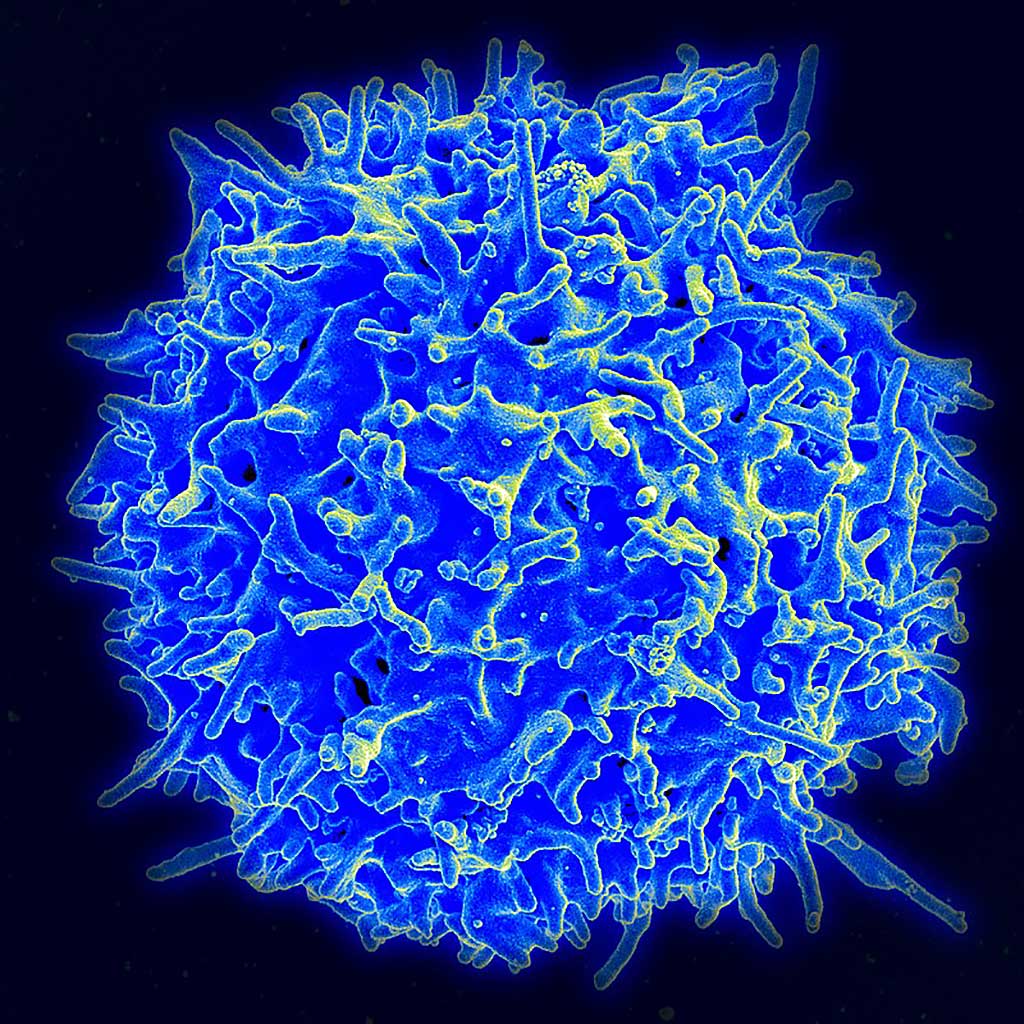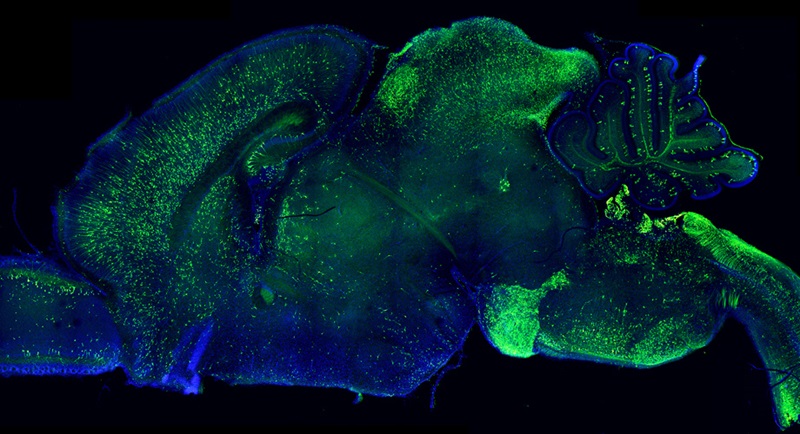T-cell Monitoring to Predict Risk of Kidney Transplant Failure
|
By LabMedica International staff writers Posted on 23 Mar 2020 |

Image: Scanning electron micrograph of a human T-cell (Photo courtesy of Wikimedia Commons)
A recently published paper discussed the potential application of CD8+ memory T-cell monitoring to improve risk prediction for kidney transplant failure.
Identifying biomarkers for predicting kidney transplant failure requires better understanding of the immune response to chronic allogeneic stimulation. In this regard, investigators at the Université de Nantes (France) analyzed blood samples from 284 kidney transplant recipients.
The investigators evaluated the frequency and function of CD8+ T-cell subsets -including effector memory (EM) and terminally differentiated EM (TEMRA) CD8+ T-cells - in blood samples from the 284 kidney transplant recipients recruited one year post-transplant and followed their progress for a median of 8.3 years.
Results revealed that increased frequency of circulating TEMRA CD8+ T-cells at one year post-transplant associated with increased risk of graft failure during follow-up. This association remained after adjustment for a previously reported composite of eight clinical variables, the Kidney Transplant Failure Score. In contrast, increased frequency of EM CD8+ T-cells associated with reduced risk of graft failure.
"The identification of at-risk kidney transplants is based on clinical metrics already measured in the standard of care of patients and on the quantification of blood subsets of CD8+ cells that could be easily transferable in the routine monitoring of kidney transplant recipients," said senior author Dr. Nicolas Degauque, medical researcher at the Université de Nantes. "The findings are important because early identification of at-risk kidney transplant recipients is critical to allow physicians to adapt their care by either increasing the frequency of patient monitoring or by introducing new therapeutics adapted to patients' own risks."
The paper was published in the March 12, 2020, online edition of the Journal of the American Society of Nephrology.
Related Links:
Université de Nantes
Identifying biomarkers for predicting kidney transplant failure requires better understanding of the immune response to chronic allogeneic stimulation. In this regard, investigators at the Université de Nantes (France) analyzed blood samples from 284 kidney transplant recipients.
The investigators evaluated the frequency and function of CD8+ T-cell subsets -including effector memory (EM) and terminally differentiated EM (TEMRA) CD8+ T-cells - in blood samples from the 284 kidney transplant recipients recruited one year post-transplant and followed their progress for a median of 8.3 years.
Results revealed that increased frequency of circulating TEMRA CD8+ T-cells at one year post-transplant associated with increased risk of graft failure during follow-up. This association remained after adjustment for a previously reported composite of eight clinical variables, the Kidney Transplant Failure Score. In contrast, increased frequency of EM CD8+ T-cells associated with reduced risk of graft failure.
"The identification of at-risk kidney transplants is based on clinical metrics already measured in the standard of care of patients and on the quantification of blood subsets of CD8+ cells that could be easily transferable in the routine monitoring of kidney transplant recipients," said senior author Dr. Nicolas Degauque, medical researcher at the Université de Nantes. "The findings are important because early identification of at-risk kidney transplant recipients is critical to allow physicians to adapt their care by either increasing the frequency of patient monitoring or by introducing new therapeutics adapted to patients' own risks."
The paper was published in the March 12, 2020, online edition of the Journal of the American Society of Nephrology.
Related Links:
Université de Nantes
Latest Molecular Diagnostics News
- World’s First One-Minute Hepatitis C Antibody Test Facilitates Quick Triage
- Game-Changing Blood Test for Stroke Detection Could Bring Life-Saving Care to Patients
- Blood Proteins Could Warn of Cancer Seven Years before Diagnosis
- New DNA Origami Technique to Advance Disease Diagnosis
- Ultrasound-Aided Blood Testing Detects Cancer Biomarkers from Cells
- New Respiratory Syndromic Testing Panel Provides Fast and Accurate Results
- New Synthetic Biomarker Technology Differentiates Between Prior Zika and Dengue Infections
- Novel Biomarkers to Improve Diagnosis of Renal Cell Carcinoma Subtypes
- RNA-Powered Molecular Test to Help Combat Early-Age Onset Colorectal Cancer
- Advanced Blood Test to Spot Alzheimer's Before Progression to Dementia
- Multi-Omic Noninvasive Urine-Based DNA Test to Improve Bladder Cancer Detection
- First of Its Kind NGS Assay for Precise Detection of BCR::ABL1 Fusion Gene to Enable Personalized Leukemia Treatment
- Urine Test to Revolutionize Lyme Disease Testing
- Simple Blood Test Could Enable First Quantitative Assessments for Future Cerebrovascular Disease
- New Genetic Testing Procedure Combined With Ultrasound Detects High Cardiovascular Risk
- Blood Samples Enhance B-Cell Lymphoma Diagnostics and Prognosis
Channels
Clinical Chemistry
view channel
3D Printed Point-Of-Care Mass Spectrometer Outperforms State-Of-The-Art Models
Mass spectrometry is a precise technique for identifying the chemical components of a sample and has significant potential for monitoring chronic illness health states, such as measuring hormone levels... Read more.jpg)
POC Biomedical Test Spins Water Droplet Using Sound Waves for Cancer Detection
Exosomes, tiny cellular bioparticles carrying a specific set of proteins, lipids, and genetic materials, play a crucial role in cell communication and hold promise for non-invasive diagnostics.... Read more
Highly Reliable Cell-Based Assay Enables Accurate Diagnosis of Endocrine Diseases
The conventional methods for measuring free cortisol, the body's stress hormone, from blood or saliva are quite demanding and require sample processing. The most common method, therefore, involves collecting... Read moreHematology
view channel
Next Generation Instrument Screens for Hemoglobin Disorders in Newborns
Hemoglobinopathies, the most widespread inherited conditions globally, affect about 7% of the population as carriers, with 2.7% of newborns being born with these conditions. The spectrum of clinical manifestations... Read more
First 4-in-1 Nucleic Acid Test for Arbovirus Screening to Reduce Risk of Transfusion-Transmitted Infections
Arboviruses represent an emerging global health threat, exacerbated by climate change and increased international travel that is facilitating their spread across new regions. Chikungunya, dengue, West... Read more
POC Finger-Prick Blood Test Determines Risk of Neutropenic Sepsis in Patients Undergoing Chemotherapy
Neutropenia, a decrease in neutrophils (a type of white blood cell crucial for fighting infections), is a frequent side effect of certain cancer treatments. This condition elevates the risk of infections,... Read more
First Affordable and Rapid Test for Beta Thalassemia Demonstrates 99% Diagnostic Accuracy
Hemoglobin disorders rank as some of the most prevalent monogenic diseases globally. Among various hemoglobin disorders, beta thalassemia, a hereditary blood disorder, affects about 1.5% of the world's... Read moreImmunology
view channel.jpg)
AI Predicts Tumor-Killing Cells with High Accuracy
Cellular immunotherapy involves extracting immune cells from a patient's tumor, potentially enhancing their cancer-fighting capabilities through engineering, and then expanding and reintroducing them into the body.... Read more
Diagnostic Blood Test for Cellular Rejection after Organ Transplant Could Replace Surgical Biopsies
Transplanted organs constantly face the risk of being rejected by the recipient's immune system which differentiates self from non-self using T cells and B cells. T cells are commonly associated with acute... Read more
AI Tool Precisely Matches Cancer Drugs to Patients Using Information from Each Tumor Cell
Current strategies for matching cancer patients with specific treatments often depend on bulk sequencing of tumor DNA and RNA, which provides an average profile from all cells within a tumor sample.... Read more
Genetic Testing Combined With Personalized Drug Screening On Tumor Samples to Revolutionize Cancer Treatment
Cancer treatment typically adheres to a standard of care—established, statistically validated regimens that are effective for the majority of patients. However, the disease’s inherent variability means... Read moreMicrobiology
view channel
Integrated Solution Ushers New Era of Automated Tuberculosis Testing
Tuberculosis (TB) is responsible for 1.3 million deaths every year, positioning it as one of the top killers globally due to a single infectious agent. In 2022, around 10.6 million people were diagnosed... Read more
Automated Sepsis Test System Enables Rapid Diagnosis for Patients with Severe Bloodstream Infections
Sepsis affects up to 50 million people globally each year, with bacteraemia, formerly known as blood poisoning, being a major cause. In the United States alone, approximately two million individuals are... Read moreEnhanced Rapid Syndromic Molecular Diagnostic Solution Detects Broad Range of Infectious Diseases
GenMark Diagnostics (Carlsbad, CA, USA), a member of the Roche Group (Basel, Switzerland), has rebranded its ePlex® system as the cobas eplex system. This rebranding under the globally renowned cobas name... Read more
Clinical Decision Support Software a Game-Changer in Antimicrobial Resistance Battle
Antimicrobial resistance (AMR) is a serious global public health concern that claims millions of lives every year. It primarily results from the inappropriate and excessive use of antibiotics, which reduces... Read morePathology
view channel
Groundbreaking CRISPR Screen Technology Rapidly Determines Disease Mechanism from Tissues
Thanks to over a decade of advancements in human genetics, scientists have compiled extensive lists of genetic variations linked to a wide array of human diseases. However, understanding how a gene contributes... Read more
New AI Tool Classifies Brain Tumors More Quickly and Accurately
Precision in diagnosing and categorizing tumors is essential for delivering effective treatment to patients. Currently, the gold standard for identifying various types of brain tumors involves DNA methylation-based... Read moreTechnology
view channel
New Diagnostic System Achieves PCR Testing Accuracy
While PCR tests are the gold standard of accuracy for virology testing, they come with limitations such as complexity, the need for skilled lab operators, and longer result times. They also require complex... Read more
DNA Biosensor Enables Early Diagnosis of Cervical Cancer
Molybdenum disulfide (MoS2), recognized for its potential to form two-dimensional nanosheets like graphene, is a material that's increasingly catching the eye of the scientific community.... Read more
Self-Heating Microfluidic Devices Can Detect Diseases in Tiny Blood or Fluid Samples
Microfluidics, which are miniature devices that control the flow of liquids and facilitate chemical reactions, play a key role in disease detection from small samples of blood or other fluids.... Read more
Breakthrough in Diagnostic Technology Could Make On-The-Spot Testing Widely Accessible
Home testing gained significant importance during the COVID-19 pandemic, yet the availability of rapid tests is limited, and most of them can only drive one liquid across the strip, leading to continued... Read moreIndustry
view channel
Danaher and Johns Hopkins University Collaborate to Improve Neurological Diagnosis
Unlike severe traumatic brain injury (TBI), mild TBI often does not show clear correlations with abnormalities detected through head computed tomography (CT) scans. Consequently, there is a pressing need... Read more
Beckman Coulter and MeMed Expand Host Immune Response Diagnostics Partnership
Beckman Coulter Diagnostics (Brea, CA, USA) and MeMed BV (Haifa, Israel) have expanded their host immune response diagnostics partnership. Beckman Coulter is now an authorized distributor of the MeMed... Read more_1.jpg)














